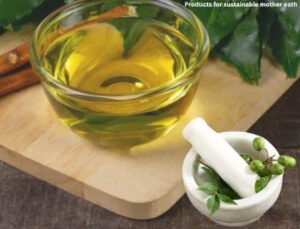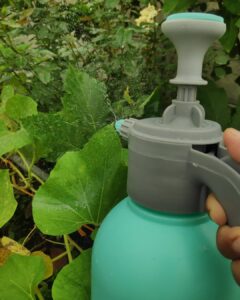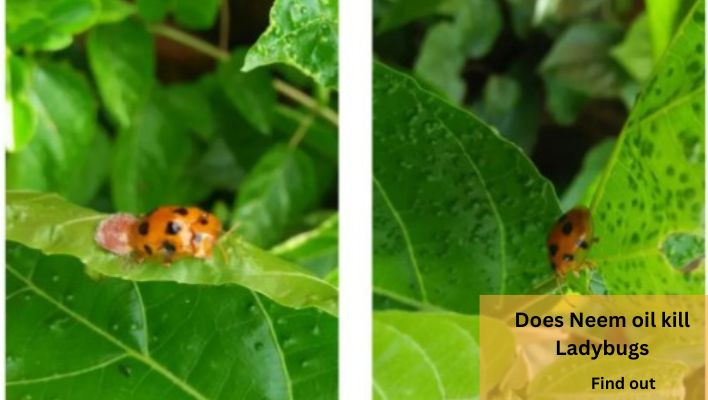If you care about your garden and its natural ecosystem, then you’ve probably heard about the numerous benefits of neem oil. This natural pesticide has been used for centuries to prevent pests and diseases, but does it harm beneficial insects like ladybugs?
We all know that ladybugs are considered good luck and are known for their ability to control harmful pests like aphids, so it’s essential to know if neem oil can harm them in any way.
Neem oil is a natural pesticide derived from the neem tree, commonly used in organic farming and gardening. However, there is some concern that neem oil may also harm ladybugs, which could have unintended consequences for pest control efforts.
Ladybugs are known to be sensitive to chemicals, and neem oil contains a compound called azadirachtin, which is toxic to some insects. While neem oil is not harmful to ladybugs in small doses, it can be harmful if used excessively or at the wrong time.
Below, we’ll explore the truth behind whether neem oil kills ladybugs and whether you can use it safely in your garden without harming these helpful little insects.
Does neem oil kill ladybugs?
While it’s true that neem oil can kill some insect species, there are concerns that it might also harm beneficial insects like ladybugs and their larvae.
Ladybugs are a common sight in many gardens and landscapes, and for a good reason. These little beetles are natural predators of many insect pests, including aphids, mites, and scale insects. Ladybug larvae are equally beneficial, devouring even more pests than their adult counterparts.
So, the question is, does neem oil harm ladybugs and their larvae? The short answer is it depends on the concentration of the neem oil and how it’s applied, according to this study on research gate.

Firstly, it is important to note that ladybugs are not the target of neem oil. Neem oil controls other pests, such as mites, aphids, and caterpillars. Ladybugs are not affected by neem oil directly and are not likely to be harmed by it unless they come into direct contact with it in large amounts.
However, neem oil can indirectly harm ladybugs by killing the insects they feed on. Ladybugs are voracious predators of other insects and rely on a steady supply of prey to survive. If neem oil is used to control the insects that ladybugs feed on, it could indirectly reduce the ladybug population.
Furthermore, neem oil can also have an impact on ladybug larvae. Ladybug larvae are also predators and rely on a steady supply of prey to develop and mature. If neem oil is used to control the insects that ladybug larvae feed on, then it could affect their growth and development.
Applying too much neem oil or spraying it too often can increase the risk of harm to ladybugs and other beneficial insects. Avoiding neem oil directly on ladybugs or their larvae is also a good idea, as this can reduce the risk of harm.
Instead, apply neem oil to the leaves and stems of plants where pest insects are present. This will help to target the insects without harming ladybugs or other beneficial insects that may be present in the area.
- Ready to Use - Simply shake and spray directly on your plants both indoors and outdoors
- Cold Pressed Neem Oil - The only RTU on the market formulated using cold pressed neem oil
- Sustainable & Eco Friendly - Comes with a variety of uses to keep your plants looking healthy
But what about other bugs?
Neem oil is effective against many insects, including mites, aphids, whiteflies, mealybugs, scale insects, caterpillars, and others. Its insecticidal properties are due to the presence of compounds called azadirachtins, which interfere with the feeding and development of insects.
However, neem oil is not selective in its insecticidal effects, meaning it can harm both beneficial and harmful insects. Therefore, it is important to use neem oil carefully and selectively, targeting only the pests causing damage or harm to your plants or crops.
It is also important to note that neem oil may not completely control insect populations, especially in cases of heavy infestations. In such cases, it may be necessary to use other control methods in conjunction with neem oil, such as insecticidal soaps, pyrethrin-based sprays, or physical removal.
In addition, it is important to use neem oil following the instructions on the label, as overuse or misuse can lead to unintended consequences, such as phytotoxicity (damage to the plant) or harm to non-target organisms.

Does neem oil kill immediately?
Neem oil is not an instant insecticide and does not kill bugs immediately upon contact. Its mode of action is different from chemical insecticides, which can kill insects quickly.
Instead, neem oil works by disrupting the feeding and developmental processes of insects, which can take some time to take effect.
The exact amount of time it takes for neem oil to kill bugs can vary depending on a number of factors, including the type of insect, the stage of its life cycle, the concentration of the neem oil, and the application method.
In general, it may take several hours to a few days or minutes for neem oil to begin to affect insect populations. The insect may stop feeding and may begin to exhibit symptoms such as slowed growth, reduced reproduction, or death.
It is important to note that neem oil may not completely control insect populations, especially in cases of heavy infestations. In such cases, it may be necessary to use other control methods in conjunction with neem oil, such as insecticidal soaps, pyrethrin-based sprays, or physical removal.
In addition, it is important to use neem oil in accordance with the instructions on the label, as overuse or misuse can lead to unintended consequences, such as phytotoxicity (damage to the plant) or harm to non-target organisms.
How to use neem oil without killing ladybugs
Neem oil is a natural and effective way to control pests in your garden or home without harsh chemicals. However, ladybugs are known to be sensitive to pesticides and other chemicals, so it’s important to be careful when using neem oil around them. So using neem oil properly is important to avoid harming beneficial insects such as ladybugs.
Here are some tips for using neem oil in a way that won’t harm ladybugs:
- Use neem oil sparingly. Neem oil is a powerful insecticide, and using too much of it can harm not only ladybugs but other beneficial insects as well. Use just enough to control the pests causing problems in your garden.
- Apply neem oil in the evening or early morning. Ladybugs are most active during the day, so applying neem oil when they’re less likely to be out and about can help minimize the risk of harming them.
- Avoid spraying neem oil directly on ladybugs or their larvae. If you see ladybugs in your garden, try to avoid spraying neem oil directly on them. Instead, focus on spraying the areas where the pests are located.
- Consider using other pest control methods. Neem oil isn’t the only way to control pests in your garden. You can also use physical barriers, such as netting or row covers, or introduce other beneficial insects, such as lacewings or parasitic wasps, that can help control pest populations.
By following these tips, you can help protect ladybugs and other beneficial insects in your garden while still using neem oil to control pests. Remember, a healthy garden is diverse, and maintaining a balance of pests and beneficial insects is key to keeping your plants healthy and thriving.
- Ready to Use - Simply shake and spray directly on your plants both indoors and outdoors
- Cold Pressed Neem Oil - The only RTU on the market formulated using cold pressed neem oil
- Sustainable & Eco Friendly - Comes with a variety of uses to keep your plants looking healthy
When should you not spray neem oil?
While neem oil is generally considered safe and effective, there are certain situations when it should not be used or when its use should be limited.
- First, neem oil should not be applied during periods of high temperature or high humidity, as this can increase the risk of phytotoxicity or plant damage. It is best to apply neem oil during cooler temperatures or early morning or evening when the plant is less likely to be stressed by heat.
- Neem oil should not be applied to drought-stressed or otherwise unhealthy plants, as this can increase the risk of plant damage or phytotoxicity.
- Neem oil should not be used on plants sensitive to oil-based products, such as ferns, some orchids, and certain succulents.
- Fourth, neem oil should not be used near water sources or aquatic environments, as it can be toxic to fish and other aquatic organisms.
In terms of when to spray neem oil, it is best to apply it at the first sign of insect or disease problems or as a preventive measure before problems arise. It is also important to apply neem oil regularly, according to the instructions on the label, to maintain its effectiveness and prevent re-infestation.

How many times can you spray neem oil?
The number of times you can spray neem oil on plants depends on several factors, including the severity of the insect or disease problem, the type of plant being treated, and the concentration of the neem oil solution.
Spraying neem oil once a week for three to four weeks is generally recommended to control insect and disease problems effectively. However, it is important to follow the instructions on the label, as the recommended frequency of application may vary depending on the specific neem oil product.
It is also important to note that repeated use of neem oil can lead to resistance in some insect populations, so it is a good idea to rotate neem oil with other methods of control, such as insecticidal soaps, to prevent this from happening.
In addition, it is important to monitor plants for any signs of phytotoxicity or other negative effects, such as leaf burn or wilting, which can occur if neem oil is overused or applied at too high a concentration. If such effects are observed, reducing the frequency of application or the concentration of the neem oil solution may be necessary.
What happens if I spray too much neem oil?
While neem oil is generally considered safe and non-toxic to humans and pets, applying too much neem oil to plants can have negative consequences. If neem oil is overused or applied at too high a concentration, it can lead to phytotoxicity or plant damage.
Symptoms of phytotoxicity may include leaf burn, wilting, yellowing or browning of leaves, and stunted growth. These symptoms can occur if the neem oil solution is too strong, if the oil is applied too frequently, or if it is applied during periods of high heat or humidity.
In addition to phytotoxicity, overuse of neem oil can also lead to resistance in some insect populations. This can occur if the same insect pests are repeatedly exposed to neem oil and may make the oil less effective over time.
To prevent these negative consequences, following the instructions on the label when using neem oil is important. This includes using the appropriate concentration of neem oil for the type of plant and insect problem being treated and applying the oil at the recommended frequency.
If phytotoxicity symptoms are observed after using neem oil, reducing the solution concentration or the application frequency may be necessary. It is also a good idea to test the neem oil solution on a small area of the plant before applying it more widely to ensure that the plant is not overly sensitive to the oil.
Conclusion
Neem oil is a popular and effective natural insecticide and repellent for controlling common garden pests. It works by disrupting the hormonal balance and feeding behavior of insects, leading to decreased feeding, growth, and reproduction.
Neem oil is generally considered safe and non-toxic to humans and pets and can be used on a wide range of plants. However, it is important to use neem oil responsibly and in accordance with the instructions on the label to prevent negative consequences such as phytotoxicity and resistance.
Neem oil is also considered safe and non-toxic to humans and pets, making it a popular choice for organic gardeners. However, it is important to use neem oil responsibly and in accordance with the instructions on the label to prevent negative consequences such as phytotoxicity and resistance.
Neem oil is a valuable tool for controlling insect and disease problems in plants, and it should be used in conjunction with other control methods for the best results. With proper use and application, neem oil can help gardeners achieve healthier, more productive plants without relying on synthetic chemicals.

